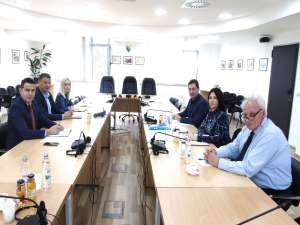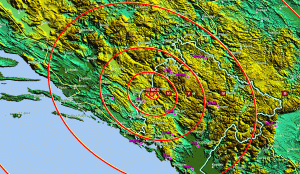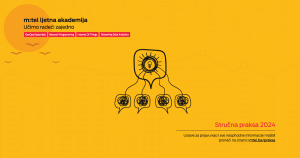SARAJEVO, May 15 (FENA) - Minister of Civil Affairs of Bosnia and Herzegovina Adil Osmanović, State Secretary at the Ministry of the Interior of Montenegro Dragan Pejanović and Secretary-General of the Ministry of Foreign Affairs of the Republic of Serbia Veljko Odalović signed today a Protocol on the establishment of a tri-border area and the border crossing point between BiH, Montenegro and the Republic of Serbia.
Minister Osmanović told reporters that signing of this Protocol will create a legal framework for implementation and marking of the mentioned tri-border point, thus finalizing another crucial phase in the final demarcation of the state border between BiH, the Republic of Serbia and Montenegro, all in accordance with the regulations of the internal legislation of these three neighboring states, as well as in accordance with the regulations of international law.
He assessed that this protocol is a real step forward in the direction of regulating the state border of BiH in accordance with the rules and principles of international law.
State Secretary at the Ministry of the Interior of Montenegro, Dragan Pejanović, said that today's signing of the protocol confirms good and neighborly relations between these three countries.
“With today's signing of the Protocol, we are actually sending another good message that the countries of the Western Balkans can independently conclude such agreements, resolve border issues with their own negotiating capacities,” Pejanović said.
He explained that the tri-border point is a common point located in the cadastral municipalities Poblaće (Montenegro), Sočice (Serbia) and Đakovići-Zaborak (BiH), specially located in Zelena glava.
He pointed out that Montenegro is very committed to resolving bilateral issues with its neighbors, and that one of the important foreign policy priorities of the Government of Montenegro is precisely the development and improvement of good neighborly relations and regional cooperation.
“The European Union strategy, precisely the strategy of the European Commission on the credible perspective of the Western Balkans, foresees, among other things, that open bilateral issues between the countries of the region must be resolved before the accession of the Western Balkan countries to the EU. The EU will not and cannot import bilateral disputes,” noted Pejanović.
He assessed that the conclusion of international treaties on the state border, as well as the protocol in question will contribute to stabilization, improvement of good neighborly relations, respect for territorial integrity and sovereignty and the progress of this region as a whole.
Secretary-General in the Ministry of Foreign Affairs of the Republic of Serbia, Veljko Odalović, said that Serbia in its foreign policy as one of the priorities, lists regional cooperation and resolution of regional and open issues.
He added that the ministers agreed they would continue to work more intensively on the issue of state border regulation between Serbia and BiH.
Asked about the controversial issues concerning the state border with Serbia, Minister Adil Osmanović said that, after the Border Agreement with Montenegro has been successfully signed and is in the phase of its implementation on the ground, BiH is very much interested to have the same kind of border agreement signed with the Republic of Serbia and the Republic of Croatia.
“At the meeting, before signing the protocol, we touched upon this issue, and I see that there is interest of the Republic of Serbia to solve this issue,” said Minister Osmanović.
He recalled that the last session of the Intergovernmental Diplomatic Commission for State Border between BiH and Serbia was held in 2010 and "the Republic of Serbia reiterated its request at that time regarding the changes to the border lines, which procedure would run alongside the conclusion of the state border agreement between BiH and the Republic Serbia, as well as with the accompanying technical documentation".
“However, the BiH delegation remains thoroughly at its standpoint that there could be no exchange of territory without prior signing of the border agreement between the two countries, with the accompanying technical documentation, as determined by the decision of the BiH Council of Ministers from 2004,” Osmanović reminded.
He noted that the detailed request for the correction of the state border by the Republic of Serbia with Bosnia and Herzegovina refers to four border locations.
“These are locations that should be considered, but the position of BiH is that the border agreement must be signed first, and then, if there is a need, to proceed with the correction. I think that after the today's signing of the protocol on a tri-border point, we will intensify the talks on this issue as well.
Most importantly, we are all interested in resolving this issue as soon as possible. Because there is no progress towards the EU until we resolve the issue of the border in the way we have solved it with Montenegro, and all three countries are committed to EU membership,” concluded Minister Osmanović.
Watch http://fena.ba/video/2957
Download https://drive.google.com/drive/folders/1OnuIvNDG78cAV4DV-2fV83M2uqSUnGRM?usp=sharing
(FENA) S. R.












